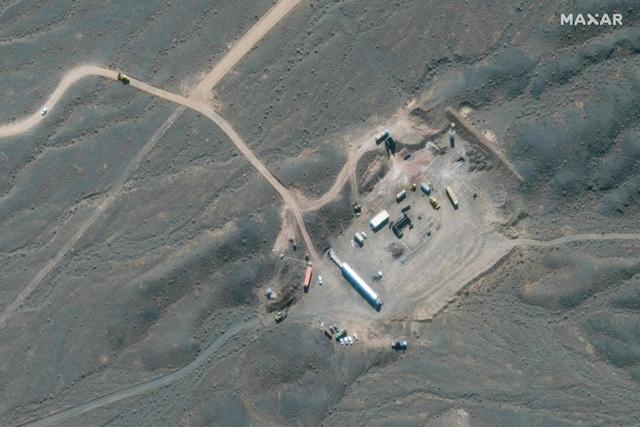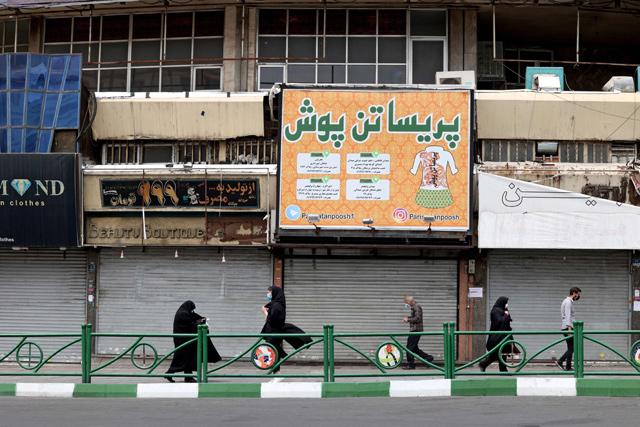You are here
Iran starts up advanced centrifuges in nuclear deal breach
By AFP - Apr 11,2021 - Last updated at Apr 11,2021

This file handout satellite image provided by Maxar Technologies on January 28, 2020, shows an overview of Iran's Natanz nuclear facility, south of the capital Tehran (AFP photo)
TEHRAN — Iran announced on Saturday it has started up advanced uranium enrichment centrifuges in a breach of its undertakings under a troubled 2015 nuclear deal, days after the start of talks on rescuing the accord.
The United States had said Friday that it had offered "very serious" ideas on reviving the hobbled agreement but was waiting for Tehran to reciprocate, something Saturday's move signally failed to do.
President Hassan Rouhani inaugurated a cascade of 164 IR-6 centrifuges for producing enriched uranium, as well as two test cascades — of 30 IR-5 and 30 IR-6S devices respectively — at Iran's Natanz uranium enrichment plant, in a ceremony broadcast by state television.
State TV aired no images of the injection of uranium hexafluoride gas into the cascades, but broadcast a link with engineers at the plant who said they had started the process and showed rows of centrifuges.
Rouhani also launched tests on the "mechanical stability" of its latest-generation IR-9 centrifuges, and remotely opened a centrifuge assembly factory to replace a plant that was badly damaged in a July 2020 "terrorist" blast.
Under the 2015 deal between Tehran and world powers, Iran is currently only allowed to use "first-generation" IR-1 centrifuges for production, and to test a limited number of IR-4 and IR-5 devices.
The US unilaterally withdrew from the nuclear deal in 2018 under then-president Donald Trump, who reimposed crippling sanctions on Tehran, which responded by stepping back from several of its commitments under the deal.
Trump's successor Joe Biden has said he is prepared to return, arguing the deal had — until Washington's withdrawal — been successful in dramatically scaling back Iran's nuclear activities.
Iran's latest move to step up uranium enrichment follows an opening round of talks in Vienna on Tuesday with representatives of the remaining parties to the deal on bringing the US back into it.
The Vienna talks are focused not only on lifting the crippling economic sanctions Trump reimposed, but also on bringing Iran back into compliance.
All sides said the talks, in which Washington is not participating directly but is relying on the European Union as an intermediary, got off to a good start.
Iran has demanded that the US first lift all sanctions imposed by Trump, including a sweeping unilateral ban on its oil exports, before it falls back in line.
The “US — which caused this crisis — should return to full compliance first,” Foreign Minister Mohammad Javad Zarif tweeted, adding that “Iran will reciprocate following rapid verification”.
‘Seriousness of purpose’
Washington has demanded movement from Tehran.
“The United States team put forward a very serious idea and demonstrated a seriousness of purpose on coming back into compliance if Iran comes back into compliance,” a US official told reporters as talks broke for the weekend.
But the official said the United States was waiting for its efforts to be “reciprocated” by Iran.
The US official indicated the major stumbling block in the initial talks was not the order of compliance but rather which sanctions were under discussion, as Iran is demanding an end to all US restrictions.
The nuclear deal, formally known as the Joint Comprehensive Plan of Action, covers only nuclear sanctions and not US measures taken in response to human rights or other concerns, the official said.
The far more powerful centrifuges started up on Saturday allow uranium to be enriched quicker and in greater amounts than Iran’s first-generation devices.
Uranium enrichment can produce the fuel for a nuclear reactor, or in highly extended form, the fissile core of an atomic warhead. It is one of the most sensitive nuclear activities carried out by Iran.
Rouhani again underlined at the ceremony, which coincided with Iran’s National Nuclear Technology Day, that Tehran’s nuclear programme is solely for “peaceful” purposes.
Related Articles
TEHRAN — Iran's atomic energy organisation said on Sunday the Natanz nuclear facility was hit by a terrorist act, hours after it said an "ac
TEHRAN — Iran has stressed its nuclear activities are peaceful and conform to safeguard obligations, after the UN nuclear watchdog said it h
Iran has conducted "mechanical" tests on a new, advanced machine to refine uranium, a senior official was quoted as saying on Wednesday, a disclosure that may annoy Western states pushing Tehran to scale back its nuclear programme.
















